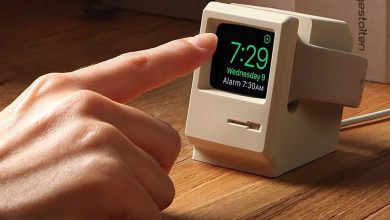The new Astro A50 X headset switches between your consoles and PC using HDMI passthrough

[ad_1]
Logitech’s Astro gaming brand has a new flagship gaming headset that costs more than some whole-ass consoles, and it’s designed to simultaneously play nice across PlayStation 5, Xbox Series X / S, and PC with a single button press.
But the $379.99 Astro A50 X doesn’t do all of this with simply plebeian technology like Bluetooth. It uses HDMI passthrough for its expansive connectivity — meaning the beefy charging dock of this headset is designed to be wired up as a central hub for much of your home audio / video setup. I hope you’re prepared to take some expert-level classes on cable management (i.e. lots of YouTube searching) if you’re looking to buy one when it ships on December 20th and not make a serpentine mess of cables out of your home theater setup.
Specs and feature-wise, the brutally futuristic-looking A50 X has 40mm graphene audio drivers that debuted in the Logitech G Pro X 2, a built-in mic capable of 16-bit 48 kHz input, Dolby Atmos support (with a Dolby license), and Logitech’s Lightspeed wireless connectivity. It also has EQ / levels tuning through Logitech G Hub (the first Astro headset to use the parent company’s app), Bluetooth for mixing in your phone audio or connecting to a Nintendo Switch (sans easy swapping), a claimed battery life of up to 24 hours on a single charge, a USB-C port in lieu of the previous model’s Micro USB, and two HDMI 2.1 inputs. Those HDMI ports are the key to connecting your Xbox and PlayStation consoles, and they support up to a 4K / 120Hz signal to pass through a single HDMI-out to your TV or monitor — meaning you shouldn’t lose any of the fancier current-gen features like VRR or ALLM if your TV supports them.
If the A50 X’s passthrough setup sounds a little confusing (ah, the joys of HDMI), it’s because it kind of is. To fully utilize it, you’ll need to plug your PlayStation and Xbox into the docking station of the A50 X via their HDMI connections (the ones you would normally plug into your TV or home audio receiver). The docking station then has to have USB connections with each console, your PC, and a power source. A lone HDMI-out from the dock then unifies all of those devices onto one input of your TV. Pick up the headset and hit the button on the ear cup to cycle between those connected devices on your TV. If you keep the headset docked, the same button should still cycle between them while letting the audio skip it and continue on to your TV speakers or sound bar.
You may notice that the A50 X doesn’t have a third HDMI-in port for connecting a PC, and that’s because Logitech seems to think PC gamers only want to use DisplayPort (which, to be fair, generally has higher bandwidth and more built in goodies than HDMI). The headset can still switch over to a connected PC with one of the three USB-C ports on its dock used for data connections of the two consoles and a computer, but switching over to your desktop monitor will have to be done manually (like you’re in the Stone Age).
Logitech seems to envision the A50 X as the one gaming headset to rule them all, and once you have your whole gaming setup running through it, you just press the PlaySync button on the rear of the right ear cup to cycle between setups. If you want to play games or use your computer with the audio coming through your speakers, for local multiplayer or because you simply don’t feel like putting headphones on at that moment, the same PlaySync button will still be used to switch video signals and pass along the audio to another device while it’s docked. The dock therefore becomes an important focal point of your setup, though you can still charge the A50 X without it by plugging into the headset’s own USB-C port — an essential task if you ever need to charge while you play.
The Astro A50 X has a lot of the natural updates you’d expect over the A50 headset from 2019 (a switch to USB-C and new audio and mic drivers), though you may need to really be into the multi-console switching to get the most out of the nearly $400 cans. If you do want one headset to handle everything across your whole gaming setup (and you don’t care for using any of the various 3.5mm wired options out there), the A50 X is the only game in town.
[ad_2]




